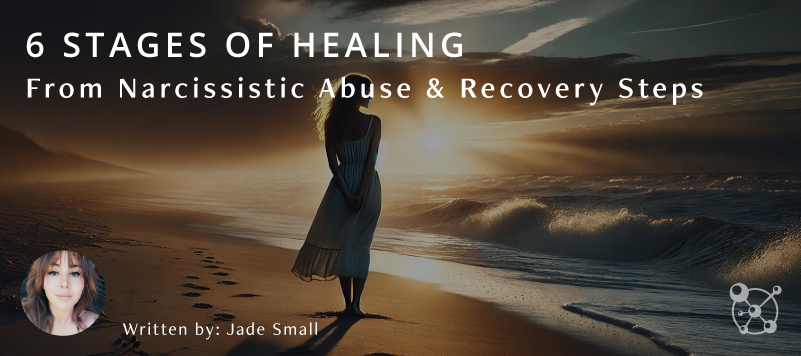Breaking free from a toxic relationship can feel overwhelming, but understanding the signs and stages of healing from narcissistic abuse provides a roadmap to reclaiming your life. The healing process isn’t linear—it’s a journey of emotional repair, self-discovery, and resilience. As you move through each stage, from shock to empowerment, you’ll recognize key shifts that signal true healing. Knowing what to expect can make all the difference, whether you’re just beginning to process the damage or finally stepping into your strength. Here’s how to navigate the six essential stages of recovery and the signs that show you’re truly healing.
Table of Contents
The 6 Stages of Healing From Narcissistic Abuse
Recovering from narcissistic abuse is a deeply personal process, and there are various ways to navigate this healing journey. The emotional wounds left by an abuser can take time to mend, but with the right strategies, you can rebuild your confidence and sense of self. Prioritizing self-care and seeking support are essential steps in breaking free from their influence and reclaiming your happiness. While healing isn’t as smooth as we’d like it to be, each effort you make brings you closer to emotional freedom. Here are some of the most effective methods to support your recovery from narcissistic abuse and help you move forward.
1. Denial
 The first stage of healing often begins with denial, where the mind struggles to accept the reality of the abuse. Victims may downplay their experiences, make excuses for the narcissist’s behavior, or convince themselves it wasn’t “that bad.” This is a pivotal step toward healing, as denial serves as a temporary emotional buffer before the truth fully sinks in. However, moving forward requires breaking through this illusion and facing the reality of the abuse.
The first stage of healing often begins with denial, where the mind struggles to accept the reality of the abuse. Victims may downplay their experiences, make excuses for the narcissist’s behavior, or convince themselves it wasn’t “that bad.” This is a pivotal step toward healing, as denial serves as a temporary emotional buffer before the truth fully sinks in. However, moving forward requires breaking through this illusion and facing the reality of the abuse.
2. Breaking the Trauma Bond
One of the most challenging parts of recovery is acknowledging the intense emotional attachment to the narcissist. Trauma bonds form through cycles of abuse and intermittent reinforcement, making it difficult to detach. Victims often feel addicted to their abuser, craving the rare moments of kindness. True healing begins when you recognize this manipulation, limit contact, and take intentional steps to free yourself from their control.
3. Grief
Letting go of a toxic relationship brings profound sadness, even when leaving is necessary. Many survivors grieve not just the relationship but also the version of themselves they lost in the process. This stage involves fully accepting the effects of trauma, mourning the illusion of what could have been, and coming to terms with the emotional damage left behind. Healing happens when you allow yourself to grieve without shame, understanding that this pain is part of the process.
4. Processing Difficult Emotions
Anger, guilt, shame, and sadness often surface as you begin confronting the reality of what you endured. Recognizing these signs of emotional turmoil is crucial, as it signals that your mind is working through the damage. This stage requires patience and self-compassion, allowing yourself to feel without suppressing or invalidating your emotions. Therapy, journaling, and mindfulness can be powerful tools in managing this emotional rollercoaster.
5. Rediscovering Your Identity
After prolonged narcissistic abuse, many survivors lose touch with who they are. The narcissist may have dictated their choices, interests, and self-perception, leaving them feeling lost. Healing involves gaining a deeper understanding of your authentic self—your passions, values, and dreams outside of the narcissist’s influence. As you reconnect with your true identity, you begin reclaiming the confidence and self-worth that were once stripped away.
6. Rebuilding Trust and Relationships
Narcissistic abuse often fosters codependency, making it difficult to trust yourself and others. Survivors may fear being manipulated again, struggle with forming healthy attachments, or feel hesitant to let people in. This stage focuses on relearning what safe, respectful relationships look like and trusting your intuition. Through therapy, self-reflection, and positive social connections, you can build stronger, healthier relationships that honor your boundaries and emotional needs.
How to Heal from Narcissistic Abuse
Healing from narcissistic abuse is a process that requires patience, self-compassion, and intentional effort. There are various ways to navigate this healing journey, each helping you regain emotional strength and rebuild your sense of self. Breaking free from the psychological grip of an abuser takes time, but prioritizing self-care and setting boundaries can accelerate your recovery. Understanding the steps to emotional healing empowers you to move forward with confidence and reclaim your happiness. Here are some of the most effective strategies for recovery from narcissistic abuse and rebuilding a life free from toxic influence.
1. Prioritize Self-Work
Healing starts with looking inward and addressing the emotional wounds left by the abuse. Self-work involves recognizing unhealthy thought patterns, building self-awareness, and developing emotional resilience. Journaling, self-reflection, and identifying personal triggers help you process the trauma and regain a sense of control over your life.
2. Seek Therapy or Join a Recovery Program
A therapist who specializes in trauma or narcissistic abuse can provide essential guidance and coping strategies. Therapy helps you unpack the emotional damage, rebuild your confidence, and develop healthier relationship patterns. Support groups and recovery programs also offer validation and connection with others who understand your experience. So, reach out to your psychologist and book an appointment as soon as you feel ready to head toward healing.
3. Engage in Mindfulness and Self-Care
 Practicing mindfulness helps ground you in the present and reduces anxiety caused by past trauma. Meditation, deep breathing, and mindful movement (like yoga) can calm the nervous system and promote emotional healing. Prioritizing self-care—whether through relaxation, hobbies, or healthy routines—helps rebuild your sense of self-worth and stability.
Practicing mindfulness helps ground you in the present and reduces anxiety caused by past trauma. Meditation, deep breathing, and mindful movement (like yoga) can calm the nervous system and promote emotional healing. Prioritizing self-care—whether through relaxation, hobbies, or healthy routines—helps rebuild your sense of self-worth and stability.
4. Practice No Contact Where Possible
Cutting off communication with the narcissist is one of the most effective ways to heal. No contact means blocking them, avoiding interactions, and refusing to engage in their manipulative tactics. If full no contact isn’t possible, the gray rock method—staying emotionally neutral and unresponsive—can help minimize their influence over your life.
5. Set and Enforce Strong Boundaries
Establishing firm boundaries is crucial to protecting your peace and preventing further emotional harm. Learning to say “no” without guilt and distancing yourself from toxic individuals allows you to regain personal power. Boundaries reinforce your self-respect and ensure that your emotional energy is invested in healthy, supportive relationships.
6. Focus on Your Future and Personal Growth
Instead of dwelling on the past, channel your energy into rebuilding your future. Setting new goals, exploring passions, and rediscovering your interests help you move forward. Whether it’s advancing your career, traveling, or embracing new relationships, focusing on personal growth empowers you to create a fulfilling life free from toxic influence.
Signs You’re Healing from Narcissistic Abuse
Healing from narcissistic abuse is a profound journey, and over time, you’ll notice a shift in your thoughts, emotions, and overall well-being. The pain that once felt all-consuming begins to fade, replaced by self-trust, confidence, and a renewed sense of purpose. Understanding the signs that you’re healing can reassure you that progress is happening, even if it doesn’t always feel linear. Recognizing these changes is an essential part of how to heal from a narcissist relationship, as they confirm that you’re moving forward and have started to regain control over your life. Here are the key indicators that you’re truly on the path to recovery.
1. You No Longer Crave Their Validation
At first, detaching from a narcissist feels impossible, as their approval once dictated your self-worth. But as you heal, you begin to trust your opinions and emotions. You stop seeking their attention, reassurance, or apologies, realizing that closure comes from within—not from them.
2. You Set and Enforce Boundaries
One of the strongest signs of healing is recognizing your right to protect your energy or sense of identity. This means finally being able to reinforce healthy boundaries. Instead of feeling guilty for saying “no,” you confidently enforce limits with toxic people. Whether it’s cutting contact, limiting conversations, or walking away from manipulation, you prioritize your well-being without fear.
3. Your Self-Esteem Starts to Rebuild
Narcissists tend to leave deep insecurities in their victims, but healing restores your self-worth. One of the most noticeable signs your healing journey is well on its way is gaining confidence in yourself again post-abuse. You begin to see yourself as valuable and capable, independent of how others treat you. You recognize that you were never the problem and start embracing self-love, positive affirmations, and personal growth.
4. You Can Recognise Manipulation Easily
After enduring gaslighting, guilt-tripping, and emotional coercion, you develop a sharp awareness of red flags. You no longer fall for love-bombing, false apologies, or guilt-driven tactics. Instead of second-guessing yourself, you trust your instincts and set firm boundaries when someone tries to control or deceive you. This newfound clarity empowers you to protect your peace and avoid toxic dynamics in the future.
5. Rediscovering You’re Life’s Passions
During an abusive relationship, you may have lost touch with your sense of self, hobbies, dreams, and ambitions. Healing allows you to reconnect with what brings you joy, whether it’s creating art, travel, music, photography, cooking, or whatever makes you feel alive. You start pursuing activities that light you up, no longer held back by fear, shame, or self-doubt.
6. You Feel Free and Excited About the Future
Rather than living in fear, anxiety, or self-doubt, you start feeling hopeful again. You look forward to new experiences, meaningful relationships, and a future without emotional chaos. You understand that healing is ongoing, but you finally feel lighter, stronger, and ready to embrace life on your terms. Moreover, you’re sense of reality will become clearer, allowing you to move forward without the burdens of psychological abuse.
The Long-term Effects of Narcissistic Abuse
 The aftermath of narcissistic abuse can extend far beyond the end of the relationship, leaving emotional and psychological wounds that take time to heal. Many survivors experience narcissistic abuse with long-term effects that impact their self-esteem, relationships, and overall mental well-being. These effects can manifest in subtle ways, often shaping behaviors and thought patterns without conscious awareness. Understanding these lasting consequences is essential for recognizing their impact and taking steps toward true recovery. Here are four common long-term effects survivors may face.
The aftermath of narcissistic abuse can extend far beyond the end of the relationship, leaving emotional and psychological wounds that take time to heal. Many survivors experience narcissistic abuse with long-term effects that impact their self-esteem, relationships, and overall mental well-being. These effects can manifest in subtle ways, often shaping behaviors and thought patterns without conscious awareness. Understanding these lasting consequences is essential for recognizing their impact and taking steps toward true recovery. Here are four common long-term effects survivors may face.
1. Emotional Dysregulation and Chronic Anxiety
Survivors of narcissistic abuse often struggle with overwhelming emotions, experiencing intense anxiety, mood swings, or emotional numbness. Years of manipulation and gaslighting can leave them in a constant state of hypervigilance, always anticipating conflict or criticism. This can make it difficult to relax, trust their own feelings, or feel emotionally stable in everyday situations.
2. Physical Health Issues Due to Chronic Stress
The prolonged stress caused by narcissistic abuse can take a toll on physical health. Survivors often experience headaches, digestive issues, sleep disturbances, and even autoimmune conditions due to heightened cortisol levels. The body remains in a fight-or-flight state long after the abuse ends, making it essential to focus on stress reduction and self-care during recovery.
3. Fear of Intimacy and Difficulty Trusting Others
Narcissistic abuse distorts survivors’ perception of love and relationships, making it challenging to trust new partners or form deep emotional connections. Many develop avoidant attachment styles, fearing vulnerability and expecting betrayal. Others may unknowingly repeat toxic relationship patterns, drawn to what feels familiar, even if it’s unhealthy.
4. People-Pleasing and Difficulty Setting Boundaries
Years of being conditioned to prioritize the narcissist’s needs over their own can lead to chronic people-pleasing and an inability to set boundaries. Survivors may struggle to say “no,” fearing conflict or rejection. This can extend into friendships, workplaces, and new relationships, making them more susceptible to further emotional manipulation if they don’t rebuild their self-worth and assertiveness.
5. Sleep Difficulties
Sleep deprivation is a long-term effect of narcissistic abuse due to chronic stress, hypervigilance, and emotional turmoil caused by manipulation tactics like gaslighting and emotional blackmail. Victims often experience heightened anxiety, making it difficult to relax, fall asleep, or stay asleep. The body’s prolonged fight-or-flight response disrupts normal sleep patterns, leading to insomnia, nightmares, and exhaustion.
Psychological Effects of Narcissistic Abuse
Mental health after narcissistic abuse can be deeply affected, leaving survivors with lasting emotional struggles. The manipulation, gaslighting, and constant invalidation can lead to anxiety, depression, and even PTSD-like symptoms. These psychological effects don’t disappear overnight but can be managed with healing strategies. Here are some of the most common ways narcissistic abuse impacts mental well-being.
1. Distorted Self-Identity and Loss of Confidence
Narcissists gradually strip away their victim’s sense of self, making them doubt their worth, abilities, and even their personality. Over time, survivors may feel like they no longer recognize themselves, struggling with a fragmented self-identity. They might question their likes, dislikes, or decisions, as they were conditioned to prioritize the narcissist’s needs over their own.
2. Persistent Feelings of Shame and Guilt
Narcissistic abuse often leaves survivors with a deep sense of shame and unwarranted guilt. They may blame themselves for the abuse, believing they weren’t “good enough” or that they somehow caused the mistreatment. This toxic self-perception can linger, making it difficult to embrace self-love and accept that they were manipulated, or not at fault.
3. Emotional Numbness and Dissociation
Many survivors experience emotional numbness or dissociation as a coping mechanism. The mind protects itself from overwhelming pain by disconnecting from emotions, leading to a sense of detachment from reality. This can make it difficult to feel joy, engage in meaningful relationships, or fully process emotions, leaving survivors stuck in survival mode even after the abuse ends.
4. Overanalyzing and Hypervigilance
After enduring gaslighting and unpredictable emotional shifts, survivors often develop hypervigilance—a heightened awareness of their surroundings and people’s behavior. They may overanalyze every interaction, fearing hidden manipulation or criticism. This constant state of alertness can be exhausting and make it difficult to relax or feel safe, even in non-threatening environments.
What Happens to Your Body After Narcissistic Abuse?
Enduring narcissistic abuse doesn’t just take a toll on your emotions—it can leave lasting physical effects on your body. The constant stress, manipulation, and emotional turmoil activate the body’s survival mechanisms, leading to long-term health consequences. Over time, these effects can manifest in ways that disrupt daily life, making recovery even more challenging.
Chronic Fatigue
Constant emotional turmoil and stress keep the body in a heightened state of alertness, leading to severe exhaustion. Victims often experience disrupted sleep, low energy levels, and an inability to recover fully, even after resting. Over time, this can make even simple daily tasks feel overwhelming.
Digestive Issues
Narcissistic abuse creates chronic stress, which directly affects the gut. Victims may suffer from nausea, bloating, acid reflux, or irritable bowel syndrome (IBS). Since the gut and brain are closely connected, emotional distress can significantly impact digestion and overall gut health.
Brain Damage
Long-term narcissistic abuse can lead to actual changes in brain structure, particularly in areas responsible for memory, decision-making, and emotional regulation. Prolonged stress can shrink the hippocampus (which controls memory) and enlarge the amygdala (which processes fear), making it harder for victims to think clearly, manage emotions, or break free from the trauma cycle.
Weakened Immune System
The body’s stress response releases high levels of cortisol, which, over time, weakens the immune system. Victims of narcissistic abuse often get sick more frequently, take longer to recover from illnesses, and may even develop autoimmune conditions due to chronic inflammation and stress overload.
Our Conclusion on How To Recover From Narcissistic Abuse
Recovering from narcissistic abuse is a gradual process that requires patience, self-compassion, and intentional healing. Breaking free from the emotional and psychological grip of an abuser is just the beginning—true recovery involves rebuilding self-worth, re-establishing healthy boundaries, and learning to trust yourself again. Prioritizing self-care, seeking professional support, and surrounding yourself with positive, understanding people can help restore your sense of identity and emotional stability. While the scars of narcissistic abuse may take time to heal, each step forward is a testament to your strength and resilience. With time and effort, you can reclaim your life, rediscover joy, and build a future free from toxic control.
NDP Recovery Help
If you are reading this and you think you might be a narcissist, or recognize harmful behaviors in yourself, know that change is possible but requires deep self-reflection and a commitment to growth. Narcissistic traits often stem from unresolved trauma or learned behaviors, but that does not excuse the pain inflicted on others. Seeking professional therapy, particularly cognitive behavioral therapy (CBT) or dialectical behavior therapy (DBT), can help address these patterns and develop healthier ways to relate to others. Support groups, self-help resources, and accountability practices can also provide guidance in fostering genuine empathy and emotional regulation. Healing is a choice that demands effort and vulnerability, but seeking help is a sign of strength—one that can lead to healthier relationships and a more authentic sense of self.
FAQs
1. How Long Does it Take To Recover From Narcissistic Abuse?
Recovery from narcissistic abuse varies for each person and can take months or even years, depending on the severity of the trauma and the support available. Healing involves therapy, self-care, and rebuilding self-worth. With time, boundaries, and emotional processing, survivors can reclaim their identity and move forward stronger.
2. Why Is It Hard To Heal From Narcissistic Abuse?
Healing from narcissistic abuse is difficult because it involves deep psychological wounds, including gaslighting, emotional manipulation, and shattered self-worth. Victims often struggle with self-doubt, trauma bonds, and anxiety, making it hard to break free mentally. Recovery requires time, self-reflection, and support to rebuild trust, identity, and emotional stability.
3. Can Narcissistic Abuse Cause Health Problems?
Yes, narcissistic abuse can cause serious health problems due to chronic stress and emotional turmoil. Victims may suffer from anxiety, depression, insomnia, weakened immune function, digestive issues, and even brain changes affecting memory and emotional regulation. Long-term exposure to stress hormones can lead to fatigue, chronic pain, and heart problems.
4. Why Narcissistic Abuse Is So Damaging?
Narcissistic abuse is deeply damaging because it erodes self-worth, distorts reality through gaslighting, and creates lasting emotional and psychological wounds. Victims often experience anxiety, depression, and PTSD, struggling with trust and self-identity. The long-term effects can impact relationships, decision-making, and overall well-being, making recovery a challenging process.
Interested in becoming a QHHT Practitioner?
Find out how YOU can become a QHHT Practitioner. We offer an entire online course journey to get you started, growing, and achieving your goals.


Jade Small
I am a creative and a wanderer. Mysteries and connections are what inspire me to write. While on my path, my purpose is to bring you information to help inspire you on your journey on this place called earth.
See more from these categories
Read similar posts

Wondering How to Trust the Universe When Things Go Wrong? It’s natural to feel lost when life doesn’t go as planned. However, learning how to have faith in the universe can transform your perspective. This practice involves believing…Read More»

In the realm of metaphysical literature, few names resonate as profoundly as Dolores Cannon. A luminary in the world of hypnosis and regression therapy, Dolores Cannon captivated readers with her unique ability to unlock the…Read More»





